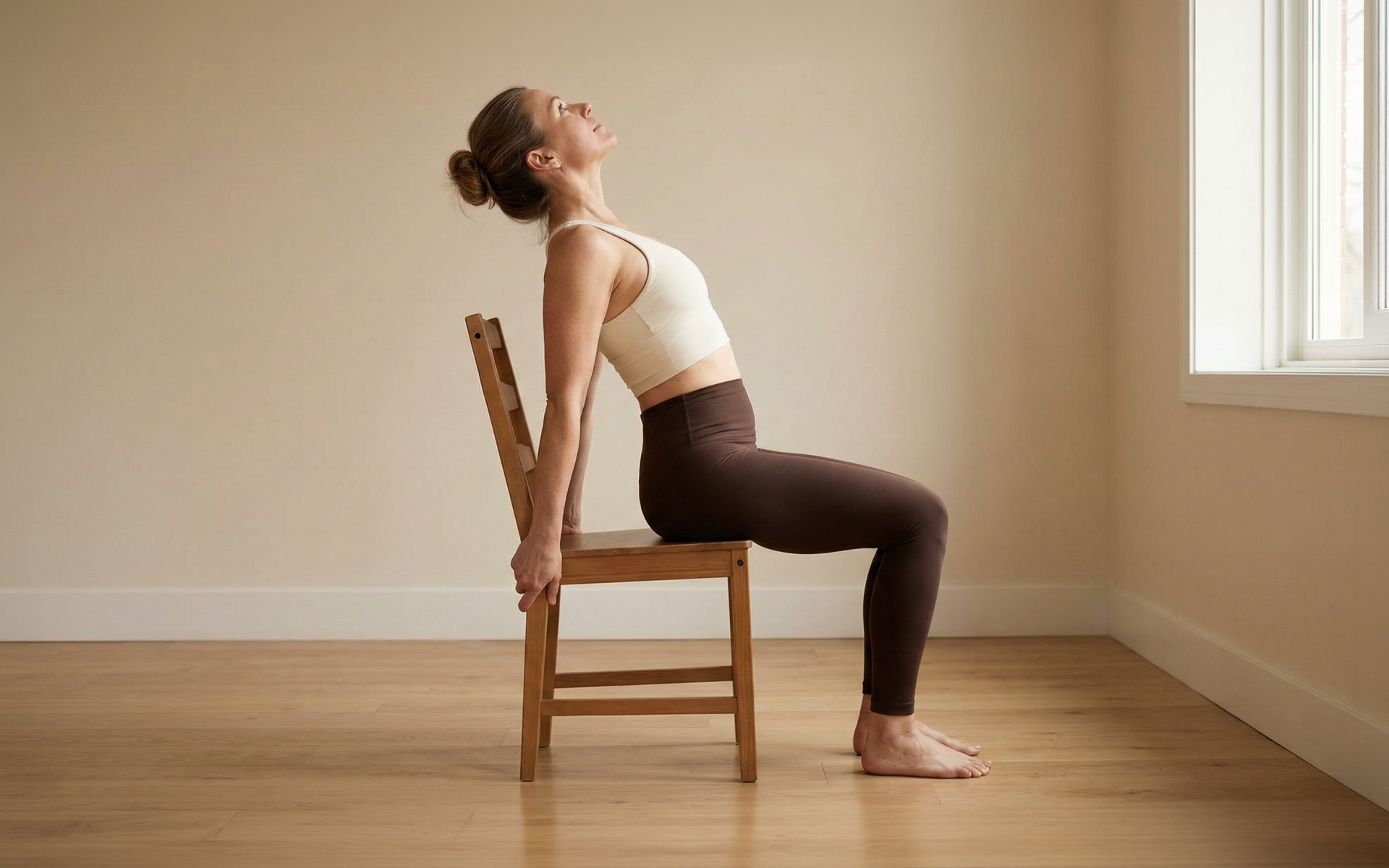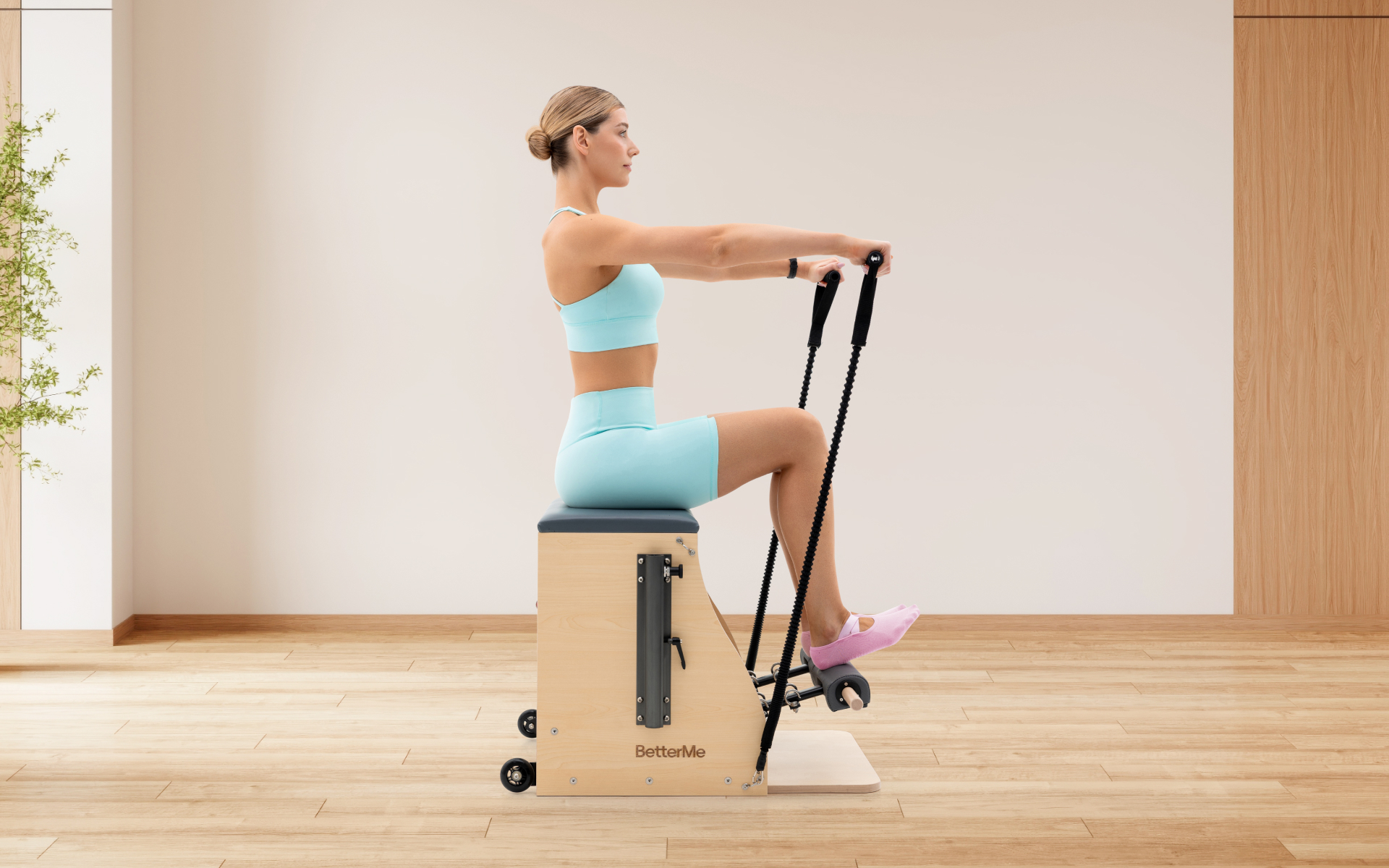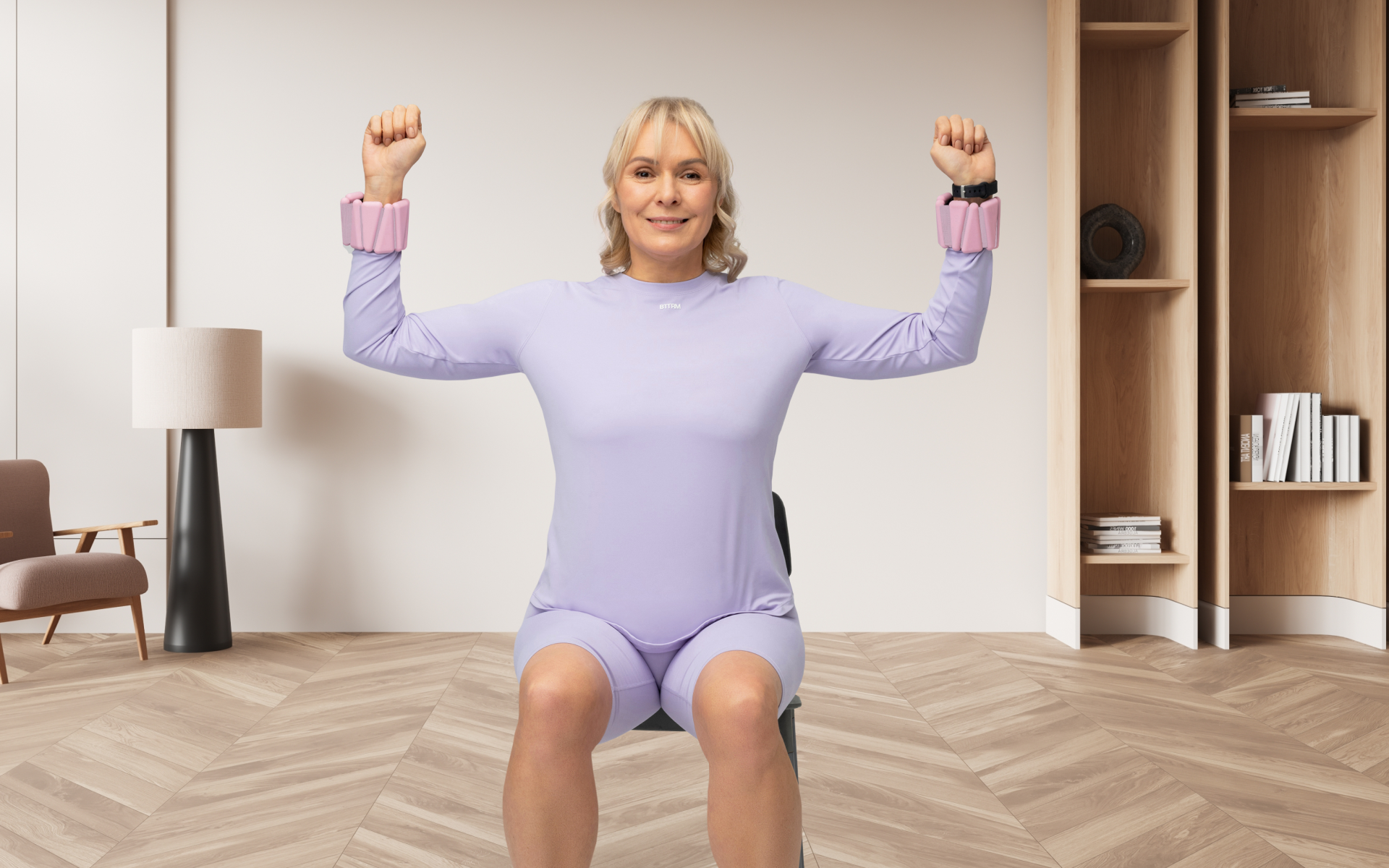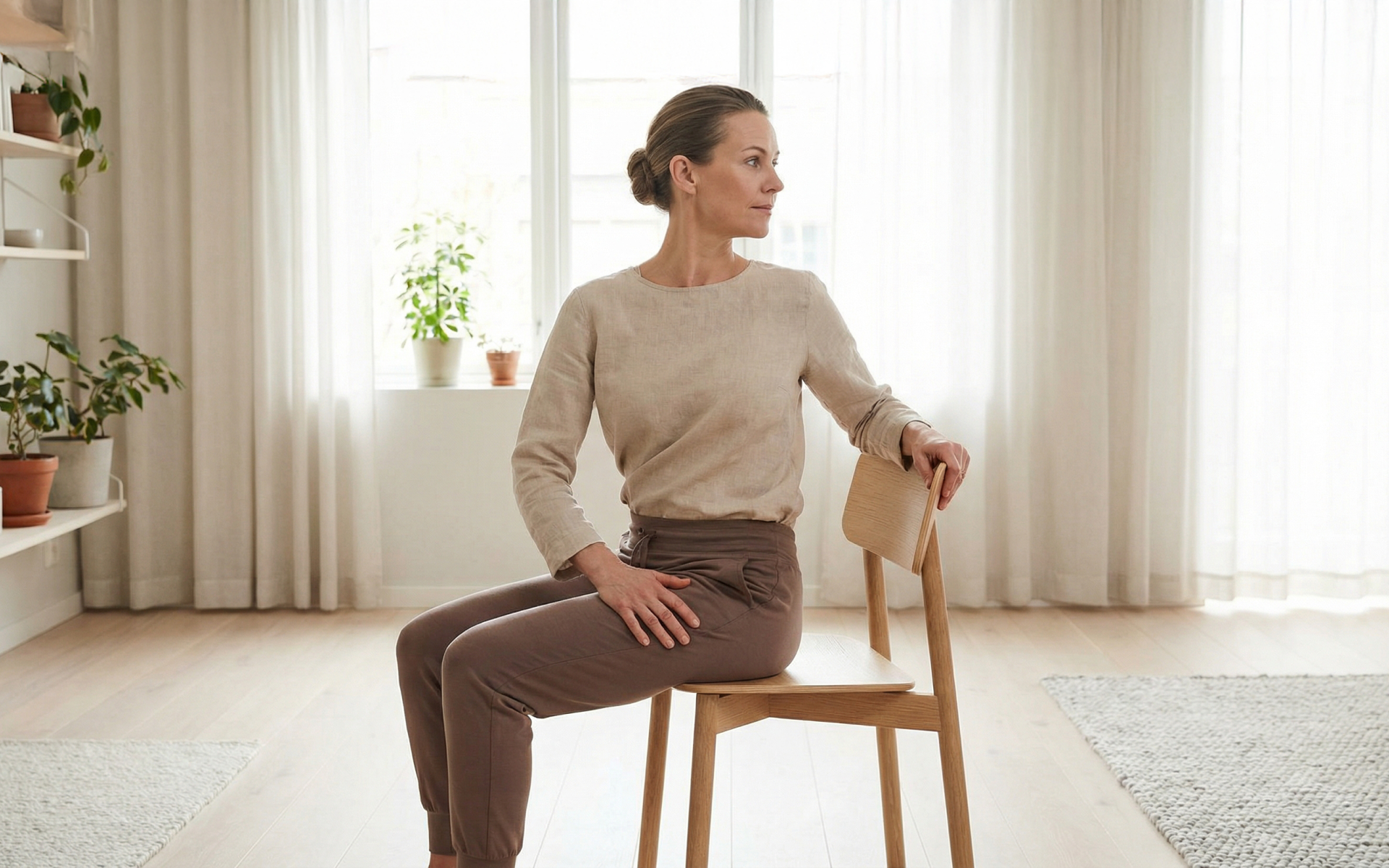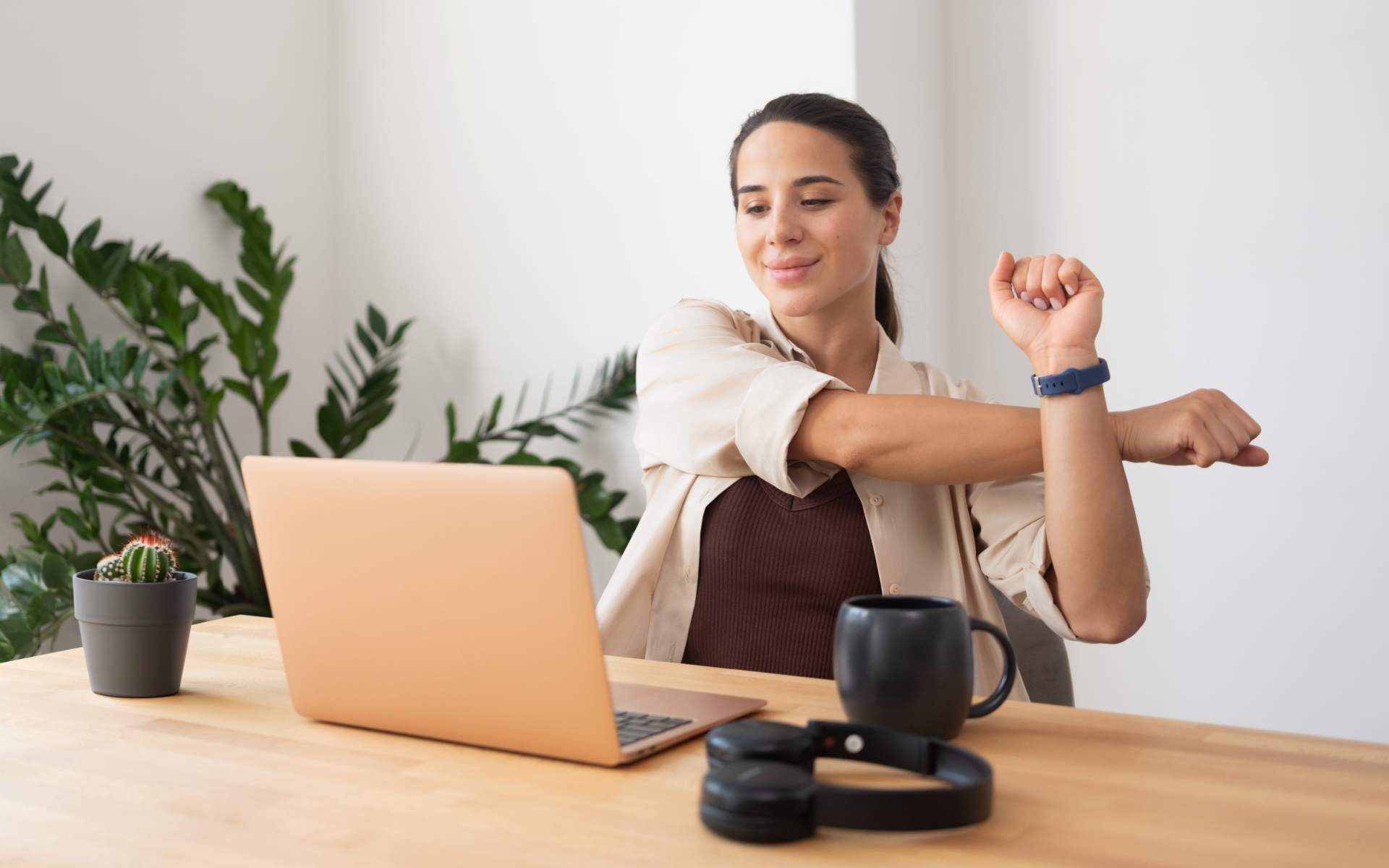Having a strong core is crucial for maintaining overall health and stability, particularly for seniors with limited mobility and those recovering from injuries. A resilient core does more than just improve balance; it supports the spine, enhances posture, and reduces the risk of falls.
According to the Mayo Clinic, a strong core can significantly aid with accomplishing daily tasks more efficiently (2).
Consider chair yoga—a gentle yet effective exercise that targets the core muscles without the need for strenuous activity. Chair yoga core exercises for seniors are designed to accommodate varying levels of mobility, making it an excellent option for those who may find traditional exercises challenging.
This approach ensures that everyone, regardless of their physical limitations, has the opportunity to build a strong and stable core.
Here’s your guide to using chair yoga to strengthen your abdomen, back, and hips, and enhance your overall quality of life.
Can Chair Yoga Strengthen the Core?
Yes, chair yoga can indeed strengthen the core. According to the National Institute on Aging, exercises involving body stabilization are fundamental to balance and stability (4).
Chair yoga core exercises for beginners include poses like seated twists, leg lifts, and forward bends, all of which engage and tone the muscles around the abdomen, back, and pelvis, which are the muscle groups that make up the “core.” These movements not only enhance muscle strength but also improve flexibility and coordination.
By incorporating chair core exercises into your routine, you can effectively work on your core muscles without the intensity of traditional workout regimens. This makes chair yoga a versatile and accessible option for anyone looking to improve their core strength, especially seniors and individuals with limited mobility.
What Is the Most Effective Core Exercise in Yoga?
There is not one single yoga exercise that can be crowned “most effective” because that answer depends on each individual’s goals and abilities. In general, any exercise that works on stabilizing the musculature that supports the spine and pelvis while promoting safe and effective movement patterns can be considered a good core exercise. However, the best exercise for a professional athlete training for Olympic weightlifting competition will not be the same as for a senior with a history of lumbar spine osteoarthritis, whose goal is simply to move better and with less pain.
While these two groups of individuals have very different goals and abilities, the principles of how to strengthen the core remain the same (albeit at much different levels of intensity).
Since the “it depends” answer is not necessarily a fun one, let’s talk about a good starting exercise for older adults who want to get into chair yoga. One good exercise to start with is the seated twist (Ardha Matsyendrasana) due to its gentle nature and ability to provide both spinal mobility and mild strengthening benefits. This exercise targets the obliques and rectus abdominis muscles, enhancing rotational movement and flexibility (1).
Incorporating this into your routine can improve digestion, burn some extra calories, and provide a comprehensive core workout, making it ideal for a range of chair yoga exercises for seniors, weight loss, and beginners alike.
To do the seated twist:
- Sit up straight on the chair with your feet flat on the ground.
- Place your right hand on the outer side of your left thigh.
- Place your left hand behind you on the chair.
- Inhale and lengthen your spine.
- Exhale and gently twist your torso to the left.
- Use your hands for support.
- Hold for a few breaths.
- Return to the starting position.
- Switch sides and repeat.
Lean and toned up body isn’t just a far-fetched fantasy. Check out the BetterMe app and watch it propel your weight loss journey into high gear!
How Do You Strengthen Your Core in a Chair?
Strengthening your core in a chair can be both effective and convenient, especially with the right chair yoga exercises.
A typical chair yoga workout requires a sturdy chair without wheels, comfortable clothing that allows for a full range of motion, and a quiet space where you can focus on your movements and breathing. This setup ensures safety and maximizes the benefits of each exercise.
To get you started, here are some essential free chair yoga exercises to help strengthen your core and improve your flexibility:
Seated Cat-Cow Stretch (Marjaryasana-Bitilasana)
The Seated Cat-Cow Stretch works on the core, specifically targeting the spinal muscles, abdominal muscles, and the shoulders. This gentle flow between arching and rounding the back is beneficial for maintaining spinal flexibility and strengthening the abdominal region.
To do this exercise:
- Sit up straight with your feet flat on the floor.
- Place your hands on your thighs.
- Inhale and arch your back, pushing your chest forward (Cow Pose).
- Tilt your head back slightly and look upward.
- Exhale and round your back, tucking your chin toward your chest (Cat Pose).
- Repeat the sequence for 5-10 breaths, ensuring smooth transitions.
Seated Forward Bend (Paschimottanasana)
The Seated Forward Bend stretches the back muscles, hamstrings, and calves while engaging the core muscles for stabilization. This pose is beneficial for enhanced flexibility and body relaxation.
To do this exercise:
- Sit up straight on the chair with your feet hip-width apart and flat on the ground.
- Extend your arms above your head as you inhale.
- Exhale and hinge at the hips, lowering your torso towards your thighs.
- Let your hands reach down toward your feet or the floor.
- Hold the position for a few breaths, feeling the gentle stretch along your back and legs.
- Inhale and slowly rise back to an upright position.
- Repeat as needed, ensuring you maintain a gentle, not forced, stretch.
Seated Warrior I (Virabhadrasana I)
Seated Warrior I engages the core, hip flexors, and leg muscles. It is beneficial for improving posture, strength, and focus.
To do this exercise:
- Sit up straight with your feet hip-width apart and flat on the ground.
- Extend your left leg back, keeping it straight with your toes pointing downward.
- Bend your right knee at a 90-degree angle.
- Raise both arms above your head, palms facing each other.
- Inhale and lengthen your spine.
- Exhale and hold the position, engaging your core.
- Maintain for a few breaths.
- Return to the starting position.
- Switch sides and repeat.
Read more: 21 Day Chair Yoga: Reasons To Add This Challenge To Your Routine
Seated Pigeon Pose (Chair Eka Pada Rajakapotasana)
The Seated Pigeon Pose targets the glutes, hip flexors, and lower back, promoting hip mobility and relieving lower back tension.
To do this exercise:
- Sit up straight with your feet flat on the floor.
- Lift your right leg and place your right ankle on your left thigh.
- Flex your right foot to protect your knee.
- Inhale and lengthen your spine.
- Exhale and hinge at the hips, leaning slightly forward if possible.
- Hold the position and take deep breaths, feeling the stretch in your right hip.
- Return to the starting position.
- Switch legs and repeat.
Chair Boat Pose (Paripurna Navasana)
The Chair Boat Pose activates the core muscles, particularly the rectus abdominis and hip flexors, enhancing balance and stability.
To do this exercise:
- Sit up straight with your feet flat on the floor.
- Hold the sides of the chair for support.
- Lean back slightly while keeping your spine straight.
- Lift your feet off the ground, bringing your knees towards your chest.
- Balance on the edge of the chair and tighten your core muscles.
- Extend your arms forward if possible.
- Hold the pose for a few breaths, maintaining the core engagement.
- Slowly lower your feet back to the ground and return to an upright position.
- Repeat as needed, ensuring controlled movements.
Seated Wide-Legged Forward Fold
The Seated Wide-Legged Forward Fold stretches the inner thighs, hamstrings, and lower back. This pose improves flexibility and promotes relaxation.
To do this exercise:
- Sit up straight on the chair, spreading your legs wide apart.
- Keep your feet flat on the floor and toes pointing forward.
- Inhale and lengthen your spine.
- Exhale and hinge at the hips, lowering your torso towards the floor.
- Reach your hands toward the floor or your feet, depending on your flexibility.
- Hold the position for a few breaths, feeling the stretch along your inner thighs and back.
- Inhale and slowly rise back to an upright position.
- Repeat as needed, ensuring a gentle stretch.
Seated Downward Facing Dog Pose Variation
The Seated Downward Facing Dog Pose variation targets the shoulders, spine, and hamstrings, promoting flexibility and relaxation.
To do this exercise:
- Sit up straight with your feet flat on the floor.
- Place your hands on the edge of the desk or the back of another chair in front of you.
- Walk your feet back until your arms are straight and your body forms an ‘L’ shape.
- Keep your legs hip-width apart and knees slightly bent.
- Inhale and lengthen your spine.
- Exhale and press your chest towards the floor, extending your back and shoulders.
- Hold for a few breaths, feeling the stretch along your spine and hamstrings.
- Slowly walk your feet back to the starting position and return to a seated posture.
- Repeat as needed, ensuring smooth transitions.
Read more: 21 Day Chair Yoga: Reasons To Add This Challenge To Your Routine
Seated Downward Facing Dog Pose Variation Both Knees Bent
This variation of the Seated Downward Facing Dog Pose targets the shoulders, upper back, and hamstrings while incorporating knee bends to provide a gentler stretch and increase accessibility, especially for those with tight hamstrings or lower back issues.
To do this exercise:
- Sit up straight with your feet flat on the floor and knees bent.
- Place your hands on the edge of a desk or the back of another chair in front of you.
- Walk your feet back until your arms are straight, and your body forms an ‘L’ shape.
- Ensure both knees are bent and feet are hip-width apart.
- Inhale and lengthen your spine, keeping your back straight.
- Exhale and press your chest towards the floor, focusing on extending your back and shoulders.
- Hold for a few breaths, feeling the stretch along your shoulders, upper back, and hamstrings.
- Gradually walk your feet back to the starting position and return to a seated posture.
- Repeat as needed, ensuring gentle, controlled movements to prevent any strain.
Find out how to put together a personalized chair yoga routine according to your goals in our blog – Chair Yoga Workout Plan.
Does Chair Yoga Work For Belly Fat?
Yes, chair yoga can help with reducing belly fat, but it is important to understand that yoga alone won’t be sufficient for spot reduction, as targeting fat loss in a specific area is not possible.
Chair yoga core exercises for weight loss are low-impact exercises that help with overall fat loss and body toning by increasing your heart rate and engaging various muscle groups.
The poses involved in chair yoga, such as Seated Warrior I and Chair Boat Pose, actively work your core, improving strength and stability, which can contribute to a flatter midsection over time. Additionally, chair yoga enhances flexibility, reduces stress, and improves mental well-being, which are crucial aspects of a holistic approach to fitness (3).
To effectively manage belly fat, it is essential to combine chair yoga with a balanced diet (5), regular cardiovascular exercises like walking or swimming, and strength training (6). Remember, consistent practice and a healthy lifestyle will yield the best results (7), making you feel and look better overall.
Looking for a way to break the vicious cycle of weight loss and tone up all the jiggly parts? Watch the extra pounds fly off and your muscles firm up with the BetterMe app!
FAQs
Is Chair Pose Good For Abs?
Yes, Chair Pose is excellent for engaging the abs. This pose requires you to maintain a semi-squat position, which activates the core muscles to help keep you balanced. By holding Chair Pose, you strengthen your abdomen, lumbar musculature, hips, and glutes to improve overall stability.
Does Yoga Build A Strong Core?
Yoga is effective for building a strong core (9). Poses like Boat Pose, Plank, and Downward Dog specifically target and engage the abdominal muscles. With consistent practice, yoga helps with developing core strength, which contributes to better posture and overall fitness.
This tailored Chair Yoga for Men guide has all the info you need to get started with this gentle form of yoga.
Is Chair Yoga Strength Training?
Chair yoga can indeed be considered a form of strength training. While it might be less intense than traditional strength workouts, many poses involve resistance and holding positions that build muscle strength. It’s particularly beneficial for individuals looking for a low-impact way to enhance their muscle tone.
Are There Benefits To Chair Yoga?
Absolutely, there are numerous benefits to chair yoga. It’s accessible to people of all fitness levels and abilities, promoting flexibility, improving joint health, and reducing stress. In addition, it aids enhanced balance and provides a gentle cardiovascular workout, making it a holistic exercise option (8).
Check out our detailed guide – Benefits Chair Yoga to learn more about how chair yoga can support your fitness and overall health.
The Bottom Line
Chair yoga offers a versatile and accessible way to enhance your physical and mental well-being. Whether you’re looking to improve flexibility, build strength, or reduce stress, incorporating chair yoga into your routine can provide significant benefits, without the need for extensive equipment or strenuous exertion.
DISCLAIMER:
This article is intended for general informational purposes only and does not serve to address individual circumstances. It is not a substitute for professional advice or help and should not be relied on for making any kind of decision-making. Any action taken as a direct or indirect result of the information in this article is entirely at your own risk and is your sole responsibility.
BetterMe, its content staff, and its medical advisors accept no responsibility for inaccuracies, errors, misstatements, inconsistencies, or omissions and specifically disclaim any liability, loss or risk, personal, professional or otherwise, which may be incurred as a consequence, directly or indirectly, of the use and/or application of any content.
You should always seek the advice of your physician or other qualified health provider with any questions you may have regarding a medical condition or your specific situation. Never disregard professional medical advice or delay seeking it because of BetterMe content. If you suspect or think you may have a medical emergency, call your doctor.
SOURCES:
- Chair Yoga (2021, journals.lww.com)
- Core exercises: Why you should strengthen your core muscles (2022, mayoclinic.org)
- Exploring the therapeutic effects of yoga and its ability to increase quality of life (2011, ncbi.nlm.nih.gov)
- Four Types of Exercise Can Improve Your Health and Physical Ability (2021, nia.nih.gov)
- Optimal Diet Strategies for Weight Loss and Weight Loss Maintenance (2020, ncbi.nlm.nih.gov)
- Taking Aim at Belly Fat (2024, health.harvard.edu)
- Weight-Loss and Maintenance Strategies – Weight Management (2004, ncbi.nlm.nih.gov)
- Yoga for everyone (health.harvard.edu)
- Yoga techniques as a means of core stability training (2009, sciencedirect.com)




